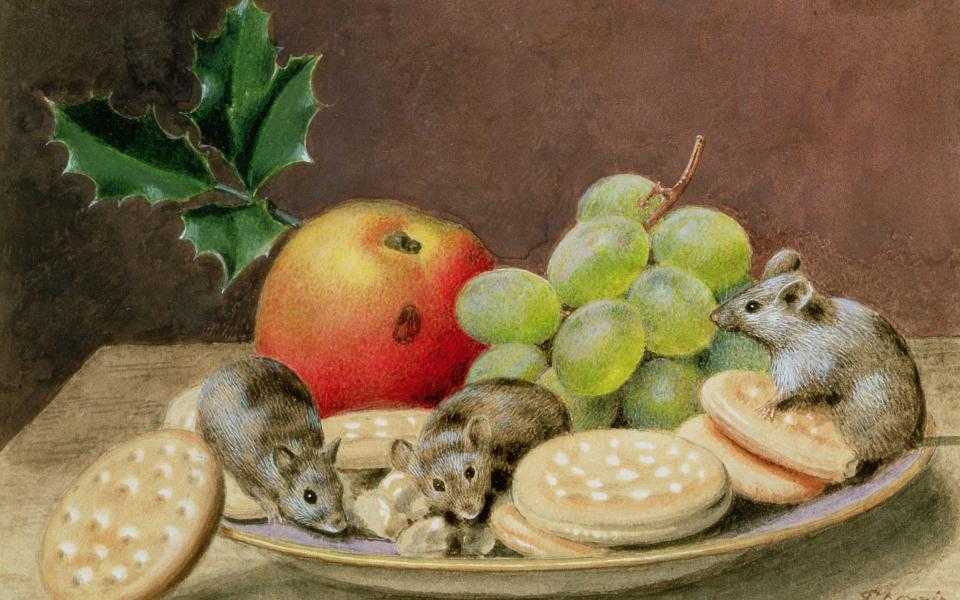Letters: Tony Blair’s vaccine intervention is the last thing the country needs

- Oops!Something went wrong.Please try again later.
SIR – Hearing Tony Blair on Radio 4 yesterday recommending that the over-80s are not given their second vaccinations made me hugely thankful that he is not prime minister anymore.
Ian MacGregor
London N7
SIR – Mr Blair suggests that, rather than keeping back half the current supply of vaccine in order to give people a second dose, it should all be used to give more people a first dose. He thinks this will still provide some protection.
The leaflet given to me when I received my first injection states: “Protection against Covid-19 disease may not be effective until at least seven days after the second dose.”
So Mr Blair’s proposal is not a good idea, according to the official advice.
Brian Jenner
Royston, Hertfordshire
SIR – William Hague (Comment, December 22) makes an important point about speeding up the mass vaccination programme. Volunteers are key to marshalling patients and handling administration. Having volunteered for some shifts at the GP-led Sutton Vaccination Centre, I now know how this should work. A lot was learnt in the first week.
It is strange that the NHS is delegating most of the responsibility for our planned mass vaccination centre to St John Ambulance – a partner of the health service, which is already severely overstretched.
These centres need new blood. They should approach organisations like the WI and volunteer groups for the help they will inevitably require.
Ann Norman
Worcester Park, Surrey
SIR – Last Saturday I received a text message inviting me to click on a link to get an appointment (not at my practice) for a vaccination (I am almost 85). After repeated attempts, I was told there were no appointments available, and asked to try again later.
Eventually, on Tuesday, at 3.45pm, the message changed to say that the code was invalid. I then received a message saying my invitation to apply had been cancelled by my practice.
When I visited the practice on Wednesday morning, I was told that it had done no such thing, and that it was unable to contact the vaccination centre in the middle of Woking. I have no means of contacting it either.
Is this yet another example of NHS IT incompetence?
John Littler
Woking, Surrey
SIR – I read about G V Buxton’s experience of a successful vaccination (Letters, December 22) with envy.
I am 91, and all I have received is a text message a week ago saying I will be vaccinated on Epsom Downs, and that I will receive an appointment. So far I have not received one.
Meanwhile, my wife, who is 88, has heard nothing from anybody – but of course she doesn’t have a mobile phone with a messaging facility.
Peter Dodd
Tadworth, Surrey
Toxic pet treatments
SIR – Rosemary Perkins, a vet at the University of Sussex, has been doing research into the effects of the use of flea and tick treatments on dogs and cats. Fipronil and imidacloprid, which are the active ingredients, were banned from agricultural use in 2017 and 2018 because of their toxic effects on bees and other insects.
The research team has now found fipronil in 99 per cent of samples taken from 20 rivers in England. No environmental impact assessment was done on the use of insecticides on pets, but more than 80 of these products are licensed for use in the UK.
With 10 million dogs and 11 million cats, most of which are treated every month, that adds up to a huge amount of pesticide in the environment. So far, no one seems to be concerned about possible effects on human health.
I treated my collie, Lizzie, for fleas only about three times in 16 years. It’s time to stop using these treatments routinely and use them only when necessary.
John Burns
Kidwelly, Carmarthenshire
Party house
SIR – I have a passion for reading house names (Letters, December 23), though many are unimaginative, but my favourite is still the house whose driveway had a weeping willow on each side. It was called Hangovers.
Linora Bennet
Tunbridge Wells, Kent
Royal number plates
SIR – I must correct Neale Edwards (Letters, December 22) and John Smith (Letters, December 23) regarding the registration number of Princess Anne’s Reliant Scimitar.
It was 1420KH as she was Colonel-in-Chief of the 14th/20th King’s Hussars from 1969 until 1992, when the Regiment then amalgamated with the Royal Hussars to become the King’s Royal Hussars. Princess Anne has been Colonel-in-Chief of the King's Royal Hussars since 1992.
Robert Winterton
Staunton in the Vale, Nottinghamshire
SIR – John Smith is in error regarding both the registration number of the Princess Royal’s Reliant Scimitar car and her regimental appointment.
The Princess was Colonel-in-Chief, not “Commander” in Chief, of the 14th/20th King’s Hussars, and the registration plate of a series of Scimitars she owned was 1420H.
Laurette Burton
Beccles, Suffolk
Illogical tiers
SIR – The Isle of Wight is to move from Tier 1 to Tier 3 on Boxing Day.
What catastrophe has brought this about? In the last week there have been 127 positive Covid diagnoses, four hospital admissions and no deaths. So there is less than one case per thousand head of population.
I and many of my colleagues have become aware of ministers’ lack of scientific understanding over the past nine months, but this lack of basic numeracy is staggering.
As an aside, if the new strain is 70 per cent more infectious, the odds are that it is less virulent. That’s how infecting organisms work.
Michael Wilkinson FRCS
Seaview, Isle of Wight
SIR – How has Britain made such a mess of a wonderful opportunity to show leadership and compassion?
Why could we not arrange adequate lavatories, washing facilities and food for all the stranded lorry drivers in Dover (report, December 23), many of whom have been forced to sleep in their cabs? The rest of Europe is laughing at us.
Ten years ago I was stranded in a snowstorm at nightfall in southern France. A fire engine arrived to rescue us and 50 other people, and we were taken to the nearest village, where the mayor had arranged for the school dinner ladies to give us a three-course meal with wine. Accommodation was found and we were treated well.
Compare that to what we have provided for the lorry drivers at Dover. It is an absolute disgrace.
Robert Jones
London W4
SIR – Bruce Murray (Letters, December 23) suggests there was no reason to stop freight travel to and from Europe, unless the EU was trying to show us what a no-deal Brexit might look like.
What it also demonstrates is the true nature of some of our friends in the EU, and how right we are to have got out.
Colin Drury
Dinas Powys, Glamorgan
Regulating e-scooters
SIR – Bill Todd (Letters, December 15) calls for strong regulations on e-scooters.
There is plenty of legislation in existence. The problem is the almost total lack of effective enforcement.
My local police claim that they regularly enforce laws against such offences as a lack of insurance and sometimes seize the devices. However, judging by the number that I see in use, it is clearly nowhere near enough.
Graham Snowden
Folkestone, Kent
SIR – I agree with Bill Todd. At the very least, scooters and cycles should be manufactured to emit a buzzing or whistling noise when they are moving, so that pedestrians are aware that there is one coming up behind them.
When walking along pavements, people often move unexpectedly to look in a shop window or to chat to someone. If they forget to look behind them first, they could be badly injured by an e-scooter.
Ann Wills
Ruislip, Middlesex
Doctor on the plane
SIR – On the subject of the use of the title “Dr” (Letters, December 18), my brother was always complaining about being woken up in the middle of his sleep to attend to an ill passenger during a long-haul flight.
As far as I’m concerned, it serves him right for booking his ticket using his title, which was the result of his PhD in theoretical physics.
Alan Brown
Medstead, Hampshire
The Christmas joke that became reality

SIR – When I was a child, my father would come home from work every Christmas Eve and say: “Have you heard the news? The Prime Minister’s cancelled Christmas.”
It was funny then.
Anne Kennerley
Chasetown, Staffordshire
SIR – In 1989 I was in the Falkland Islands over Christmas. The refrigerated supply ship containing “Christmas”, contracted by an eagle‑eyed Ministry of Defence at a most excellent price, broke down off the west coast of Africa.
In the face of no turkey, the RAF nobly propellered as much “Christmas” as it could down to us, at quite short notice, and we made the best of what there was. We then had Christmas again in March 1990 when the ship finally turned up.
Somehow that seems relevant this winter.
Lt-Col Iain Saker (retd)
Shaftesbury, Dorset
SIR – The advertisements have been persuading us to have the Christmas we all deserve. We must have been very naughty people.
Mike Penberth
Soham, Cambridgeshire
A welcoming home for endangered willow tits
SIR – In your report (December 17), the willow tit is declared the UK’s fastest‑declining bird, with numbers thought to be down to 2,750.
The willow tit is said to be unique among tit species in excavating its own nest hole, for which it requires plentiful rotting trees in wet woodland. Given the tendency for woodland habitats to be kept too tidy, the willow tit is now almost extinct in southern England. However, parts of Wales –, where the climate is wetter, small water courses are abundant, and farmers tend not to over-manage their woodland fringes –, remain a stronghold for this species.
On visits to my sister-in-law’s small equestrian property near Carmarthen in recent years, I have noticed that the willow tit is a frequent year-round visitor to her garden feeders. When I pointed out how rare the species now is, she organised a survey, which I helped to carry out in late February this year. This established that there are a minimum of three breeding pairs in and around her 20-acre plot.
This prompts two thoughts. First, willow tits will be attracted to feeders as readily as any garden species, and so this practice should be locally encouraged. Secondly, the species is easily confused with the almost identical marsh tit. This problem can be overcome by learning the distinctively different songs of the two species. If people living in favourable areas were to do so, we might discover that, while sadly remaining rare, the willow tit exists in somewhat greater numbers than first thought.
Rod Brummitt
Bournemouth, Dorset
Letters to the Editor
We accept letters by post, fax and email only. Please include name, address, work and home telephone numbers.
ADDRESS: 111 Buckingham Palace Road, London, SW1W 0DT
FAX: 020 7931 2878
EMAIL: dtletters@telegraph.co.uk
FOLLOW: Telegraph Letters on Twitter @LettersDesk

